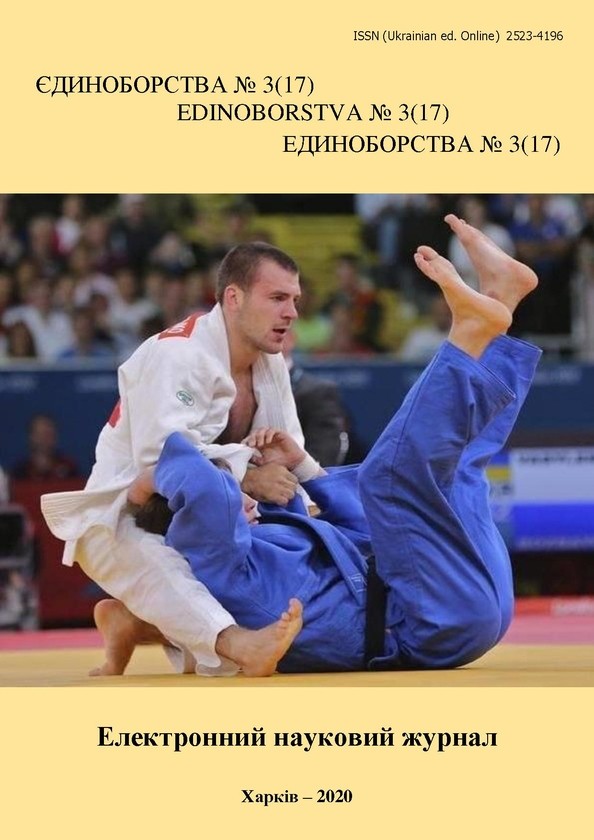Формування професійної підготовленості майбутніх тренерів зі спортивних єдиноборств з використанням тренажерних пристроїв
DOI:
https://doi.org/10.15391/ed.2020-3.02Ключові слова:
пристрій, техніко-тактична підготовленість, спортивні єдиноборства, майстерність, контрольАнотація
Мета: розробити тренажерний пристрій, спрямований на формування та контроль професійної підготовленості майбутніх тренерів зі спортивних єдиноборств. Матеріал і методи. Теоретичний аналіз, узагальнення даних науково-методичної літератури та мережі Інтернет дозволили виявити проблемне поле формування професійної підготовленості майбутніх тренерів зі спортивних єдиноборств. Аналіз документів (навчальних та робочих програм дисципліни «Теорія і методика обраного виду спорту» чи ряду відповідних дисциплін) у профільних закладах вищої освіти України, країн Співдружності Незалежних Держав та Європейського Союзу дав змогу виявити різні підходи до формування техніко-тактичної підготовленості майбутніх тренерів зі спортивних єдиноборств, а також вказав на необхідність розроблення та упровадження у навчальний процес студентів тренажерних пристроїв, які відповідали б сучасним тенденціям розвитку спортивних єдиноборств. Результати: розроблено тренажерний пристрій «ТТТ-2», призначений для удосконалення та контролю техніко-тактичної підготовленості спротсменів-єдиноборців, які навчаються у профільних закладах вищої освіти. Пристрій складається з двох моніторів; двох комп’ютерних мишей; двох панелей з кнопкою для зупинки; електрофіксатора для реєстрації виконання завдань, обладнаного світловою та звуковою сигналізацією; цифрового забезпечення, на яке подається інформація щодо виконання завдань. Висновки. На підставі аналізу науково-методичної літератури встановлено, що техніко-тактична підготовленість є одним з найважливіших компонентів професійної підготовленості майбутніх тренерів зі спортивних єдиноборств. Для її формування найбільш перспективним вважається використання інтерактивних засобів. Розроблено тренажерний пристрій «ТТТ-2», головною перевагою якого є можливість розвитку не лише вмінь та навичок, необхідних у професійній діяльності майбутніх тренерів зі спортивних єдиноборств та їх вихованців, а й можливість отримання оперативного зворотного зв’язку між студентом та викладачем у реальному часі.
Посилання
Бріскін, Ю. А., Пітин, М. П., Задорожна, О. Р., Хомяк, І. І., & Богуславська, В. Ю. (2019). Тренажер для удосконалення та контролю тактичної, технічної та теоретичної підготовленості спортсменів-єдиноборців («ТТТ-2») : пат. 135300 Україна, МПК (2019.01) А63В 69/00 / − № u2019 00564 ; заявл. 21.01.2019 ; опубл. 25.06.2019 ; бюл. № 12.
Бусол, В. А. (2018). Теорія і методика обраного виду спорту та спортивно-педагогічне вдосконалення (фехтування) : робоча програма дисципліни для студентів 3 курсу галузі знань 01 «Освіта/Педагогіка» спеціальності 017 «Фізична культура і спорт» рівня вищої освіти «бакалавр» факультету фізичної культури і спорту. ЛДУФК, Львів.
Краевич, А. С., & Счеснюк, В. М. (2014). Теория и методика спортивной подготовки в избранном виде спорта. Учебная программа учреждения высшего образования по учебной дисциплине для направления специальности 1-88 02 01-01 «Спортивно-педагогическая деятельность (тренерская работа по карате). Минск.
Никитенко, А. О., & Бусол, В. А. (2018). Теорія і методика спортивних двобоїв : робоча програма навчальної дисципліни для студентів 1 курсу галузі знань: 01 «Освіта / педагогіка» спеціальності: 017 «Фізична культура і спорт» рівня вищої освіти: перший (бакалаврський) факультету фізичної культури і спорту та факультету педагогічної освіти. ЛДУФК, Львів.
Пітин, М. П. Тренер-професіонал : лекція з навчальної дисципліни «Професійна майстерність тренера». [Електронний ресурс]. Доступно: http://repository.ldufk.edu.ua/handle/34606048/3716. Дата звернення: Листопад 15, 2019.
Сватьєв, А. В. (2013). Теоретичні і методичні засади підготовки майбутнього тренера-викладача до професійної діяльності. (Автореф. дис.…д-ра пед. наук). Запоріжжя, Україна.
Хазім, Т. (2017). Удосконалення системи підготовки спортсменів на основі підвищення рівня організаційно-управлінської підготовленості майбутніх тренерів. (Автореф. дис.…канд. наук з фіз. виховання і спору). Харків, Україна.
Шуберт, В. С. (2018). Теорія і методика обраного виду спорту та спортивно-педагогічне вдосконалення (фехтування) : робоча програма дисципліни для студентів 4 курсу галузі знань 01 «Освіта/Педагогіка» спеціальності 017 «Фізична культура і спорт» факультету фізичної культури і спорту. ЛДУФК, Львів.
Allerdissen, M., Güldenpenning, I., Schack, T., & Bläsing B. (2017). Recognizing fencing attacks from auditory and visual information: A comparison between expert fencers and novices. Psychology of Sport and Exercise, 31(1), 123-130.
Arziutov, G., Iermakov, S., Bartik, P., Nosko, М., & Cynarski, W.J. (2016). The use of didactic laws in the teaching of the physical elements involved in judo techniques. Ido Movement for Culture. Journal of Martial Arts Anthropology, 16, 4, 21–30. doi: 10.14589/ido.16.4.4. (in English).
Cote, J., & Gilbert, W. (2009). An integrative definition of coaching effectiveness and expertise. International Journal of Sports Science & Coaching, 4(3), 307-323.
Deutsche Sporthochschule [Електронний ресурс]. – Режим доступу: https://www.dshs-koeln.de/ (дата звернення: 03.12.19).
Kılıç, K., & Ince, M. L. (2012). How do the Turkish coaches access the knowledge of sport science? International Sport Sciences Congress Proceedings Book, Denizli, Turkey.
Korobeynikov G., Korobeinikova L., Mytskan B., & Cynarski W. (2017). Information processing and emotional response in elite athletes. Ido Movement For Culture. Journal of Martial Arts Anthropology. 17 (2), 41–50.
Kriventsova, I. M., Iermakov, S., Bartnik, P., Nosko, M., & Cynarski ,W.J. (2017). Optimization of students-fencers’ tactical training. Ido Movement For Culture. Journal of Martial Arts Anthropology, 17, 3, 21-30.
Langan, E., Blake, C., & Lonsdale, А. (2013). Systematic review of the effectiveness of interpersonal coach education interventions on athlete outcomes. Psychology of Sport and Exercise, 14, 37-49.
Leeds Beckett University. [Електронний ресурс]. – Режим доступу: https://courses.leedsbeckett.ac.uk/sportscoaching/ (дата звернення: 03.12.19).
Physical Education Programme. The Karkonosze State University of Applied Sciences. [Електронний ресурс]. – Режим доступу: http://www.kpswjg.pl/en/physical-education-programme. (дата звернення: 03.12.19).
Simoes M., Gomes P., & Avelar-Rosa B. (2012). Martial arts and combat sports in physical education and sport sciences degrees – a comparative study of Brazil, France, Portugal, and Spain. InYo. The Journal of Alternative Perspectives on the Martial Arts and Sciences, 13-28.
University of Nottingham Sport. [Електронний ресурс]. – Режим доступу: https://www.nottingham.ac.uk/sport/ (дата звернення: 03.12.19.).











